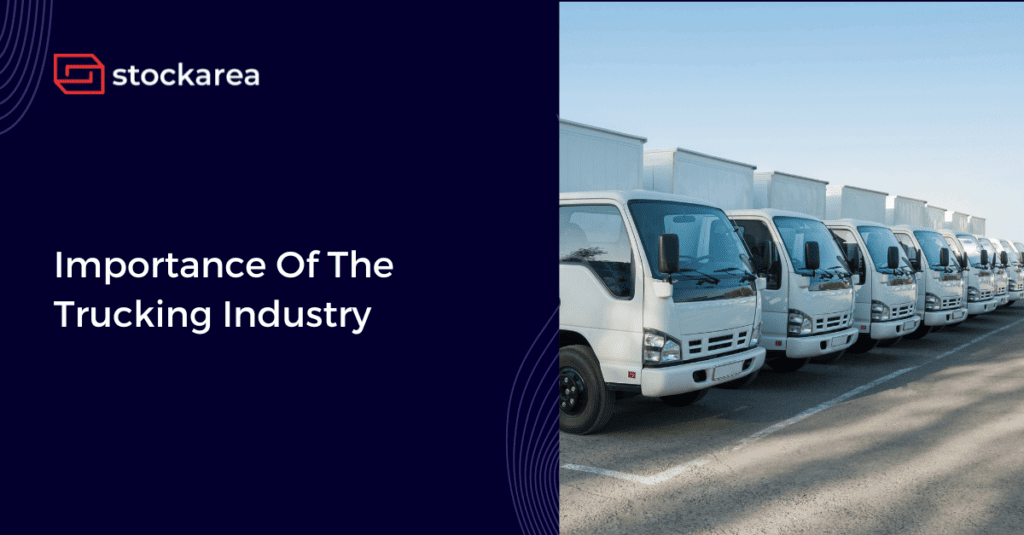Trucking is an essential part of the transportation industry. It provides the backbone for the movement of goods and commodities, often over long distances. From transporting raw materials to finished products, the trucking industry is a vital element in the global supply chain. As such, it is an essential part of global commerce, helping to ensure that goods are delivered in a timely manner and without any damage. Over the years, the importance of the trucking industry has grown significantly, and it is one of the main factors that determine the success of any business.
1. Economic Contribution
Our economy relies on the purchase of goods and services by consumers. The trucking industry facilitates the efficient and rapid transport of goods and services, making it crucial for the growth of the global economy. Without the trucking industry, businesses would not be able to function as efficiently, which could reduce economic output. Trucks can reach a broader range of destinations than other forms of transportation and can transport various goods, from raw materials to finished products. This allows businesses to access new markets and customers and to respond quickly to changes in demand. Trucking also plays a crucial role in global trade, enabling companies to import and export goods across borders, thus promoting economic growth.
2. Faster Local Deliveries
The trucking industry helps with fast local deliveries by using a fleet of vehicles that can quickly and efficiently transport goods over short distances. Depending on the size and volume of the shipment, trucking companies utilise a variety of vehicles, ranging from small delivery vans to large tractor-trailers. This is especially important for businesses that rely on just-in-time inventory management, in which products are delivered precisely when they are required. Numerous trucking companies also use advanced logistics and routing software to optimise delivery routes and guarantee on-time delivery.
3. Emergency Services
In times of crisis, trucking companies are frequently the first responders, transporting essential supplies to the disaster site. They provide timely and reliable transportation of food, water, medical supplies, and other critical items to communities affected by natural disasters and other emergencies. They also provide evacuees with a means to reach safety, transporting them away from danger.
Trucking is also an integral part of recovery efforts following a natural disaster. They are responsible for delivering goods and supplies to those affected and for assisting in the reconstruction of infrastructure that has been damaged. Truckers also aid in the removal of debris and hazardous materials following a natural disaster.
4. Links Transportation
The trucking industry plays a critical role in linking transportation by providing the necessary connectivity between different modes of transportation, such as ships, trains, and planes. Trucking companies are able to pick up and deliver goods from ports, airports, and rail yards, and then transport them to their final destination. This allows for efficient and cost-effective movement of goods between different regions and across international borders. Additionally, trucking companies often partner with other transportation providers to offer intermodal services, which combine different modes of transportation to provide a more comprehensive and efficient logistics solution. For example, a shipping container may be transported by boat to a port, then loaded onto a truck for delivery to a distribution centre, and finally shipped by air to the final destination.
5. Employment Opportunities
The trucking industry is a significant source of employment in many rural and remote areas globally. Trucking companies frequently hire drivers from these regions, offering them competitive salaries and benefits. This helps to create jobs in areas that may otherwise struggle to find employment and helps to bring economic development to these areas. Other professionals in the trucking industry include dispatchers, logistics coordinators, and mechanics. These jobs support the operations of trucking companies and are essential to the industry’s smooth operation.
6. Role in E-commerce
The trucking industry plays a crucial role in the expansion of e-commerce by providing the necessary infrastructure to transport goods from warehouses and distribution centres to customers’ homes. Most e-commerce goods are delivered by truck because it is the most cost-effective and efficient method of transporting large quantities of goods over medium to long distances. The trucking industry has the flexibility to handle a wide variety of goods and package sizes and adapt quickly and effectively to shifting market demands. In addition, the trucking industry has adopted newer technologies such as GPS, Electronic Logging Devices (ELDs), and other fleet management systems to optimise routes and improve the efficiency of the delivery process, thereby making e-commerce deliveries more convenient and faster.
Related posts
- Top 11 Trucking Industry Trends In 2024
- 7 Key Functions Of Logistics Company
- What Is Reverse Logistics?
- 6 Effective Ways To Grow Your Logistics Business
- 6 Key Benefits Of Reverse Logistics Process
- 7 Latest Technologies Changing The Trucking Industry
- 7 Proven Methods To Improve Transport Efficiency
- 5 Key Differences Between Supply Chain Management & Logistics
- Top 12 Courier Services In Delhi
- Reduce Freight Cost: Best Practices & Strategies
- Reducing Full Truckload (FTL) Costs: 10 Best Practices
- 7 Key Differences between FIFO vs LIFO Inventory Valuation Method
- 10 Must-Have Transport Management System Features
